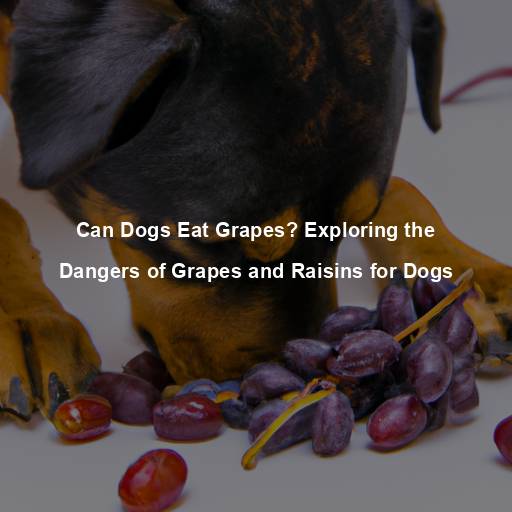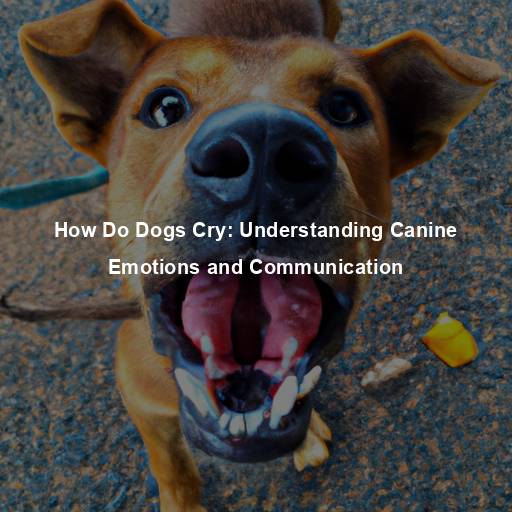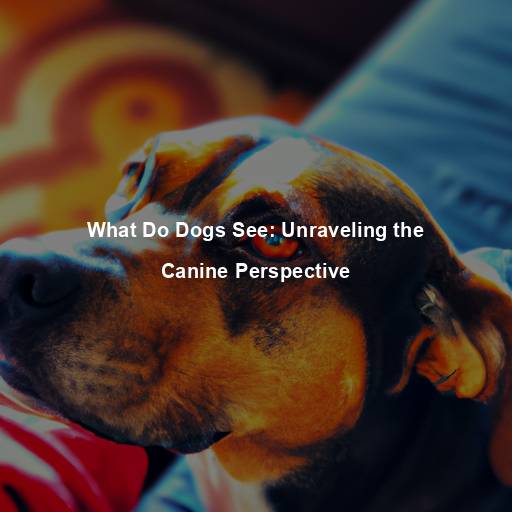Can Dogs Eat Grapes? Exploring the Dangers of Grapes and Raisins for Dogs
Last Updated on July 30, 2023 by Evan
Contents [hide]
- 1 Understanding the Risks – What You Need to Know
- 2 The Potential Consequences: Kidney Failure and Beyond
- 3 Prevention is Key: Keeping Grapes and Raisins Away from Dogs
- 3.1 Educate Yourself and Others
- 3.2 Secure Your Food
- 3.3 Be Cautious with Leftovers
- 3.4 Choose Dog-Safe Alternatives
- 3.5 Read Labels and Be Aware
- 3.6 Carrots
- 3.7 Blueberries
- 3.8 Pumpkin
- 3.9 Sweet Potatoes
- 3.10 Watermelon
- 3.11 Peanut Butter
- 3.12 Cooked Chicken or Turkey
- 3.13 Yogurt
- 3.14 Dogs and Their Innate Curiosity
- 3.15 The Evolutionary Background
- 3.16 The Sensory Experience
- 3.17 Boredom and Anxiety
- 4 Understanding Pica: When Dogs Eat Inedible Objects
- 5 FAQs: Can Dogs Eat Grapes
- 5.1 Can dogs eat grapes?
- 5.2 Why are grapes dangerous for dogs?
- 5.3 What are the symptoms a dog may experience after eating grapes?
- 5.4 What should I do if my dog eats grapes?
- 5.5 Are all types of grapes equally harmful to dogs?
- 5.6 Is it safe to give my dog grape-flavored products?
- 5.7 Can dogs eat other fruits instead of grapes?
- 5.8 What if my dog accidentally eats grapes?
Understanding the Risks – What You Need to Know
Grapes and raisins are delicious and healthy snacks for humans, but can our furry friends enjoy them too? Unfortunately, the answer is a resounding no. In fact, grapes and raisins can be extremely toxic to dogs, posing serious health risks. As a responsible pet owner, it is crucial to be aware of the potential dangers associated with grapes and raisins and take necessary precautions to keep our canine companions safe.
The Toxic Component: What Makes Grapes and Raisins Dangerous
The exact toxic substance in grapes and raisins that affects dogs is yet to be identified. However, research suggests that it is not the fruit itself, but rather a compound within it that poses the threat. This compound, yet unidentified, can cause severe kidney damage in dogs, leading to acute kidney failure. The reaction seems to vary among different dogs, with some experiencing adverse effects after consuming just a few grapes or raisins, while others may show no symptoms even after consuming larger quantities.
Symptoms of Grape or Raisin Toxicity in Dogs
Identifying grape or raisin toxicity in dogs can be challenging, as symptoms may not appear immediately. However, it is essential to watch for any signs of distress and seek immediate veterinary attention if you suspect your dog has ingested grapes or raisins. Common symptoms of grape or raisin toxicity in dogs include:
Experience the unexpected rush of bodily rebellion with our latest feature on the curious phenomenon of vomiting. Delve into the untamed world of the stomach’s revolt, as we explore the myriad reasons why our bodies choose to expel their contents in such a perplexing manner. Prepare yourself for a rollercoaster ride of nauseating tales and intriguing insights that will leave you astounded and possibly reaching for the nearest barf bag.
– Diarrhea
Feeling a sudden lack of interest in food? If your appetite has mysteriously vanished, leaving you bewildered and unsure of what to do, you’re not alone. Many people experience this perplexing phenomenon, which can be caused by various factors such as stress, illness, or changes in routine. Don’t fret, though – there are simple strategies to reignite your desire to eat and restore balance to your meals.
– Lethargy
– Abdominal pain
Feeling a sudden urge to quench your thirst? And the call of nature seems a little more persistent lately? Don’t fret, you’re not alone. Many have noticed an increase in both thirst and trips to the bathroom, leaving them perplexed and wondering what could be causing this mysterious burst of bodily sensations.
– Weakness
Discover the remarkable phenomena of involuntary body movements, whether they be subtle tremors or intense seizures. Delve into the intriguing intricacies of these perplexing events that leave us questioning the delicate balance of our own existence. Join us on a journey to unravel the enigma of these enigmatic bodily experiences and unlock the secrets they hold within. Open your mind to the unexplained as we explore the kaleidoscope of emotions and medical mysteries surrounding these fascinating episodes.
If you start catching your pup exhibiting any of these alarming symptoms or you suspect that they’ve taken a bite of those sneaky grapes or raisins, it’s crucial to swiftly reach out to your trusty veterinarian. Taking quick action can truly be a game-changer in your furry friend’s overall well-being and outlook. So, don’t sit on the fence, make that call!
The Potential Consequences: Kidney Failure and Beyond
Grape and raisin toxicity poses a perplexing threat, particularly because it has the potential to cause bewildering damage to a dog’s kidneys. The enigmatic aspect of this issue lies in the fact that even a minuscule amount of these seemingly harmless treats can unleash catastrophic consequences on certain furry friends. With acute kidney failure lurking in the shadows, the enigmatic severity of the damage inflicted varies from one dog to another, adding an element of bewilderment to this matter.
Why Are Dogs More Susceptible?
The exact reason why dogs are more susceptible to grape and raisin toxicity compared to other animals or humans is still not fully understood. It is believed that their metabolism or the way their bodies process certain compounds present in grapes and raisins plays a role. Additionally, the size of a dog and the amount consumed can also influence the severity of the reaction.
Immediate Veterinary Care: The Key to Treatment
If you find yourself in the perplexing situation where you believe your furry friend may have indulged in the forbidden fruit of grapes or raisins, don’t delay in seeking the expertise of a veterinarian. With their burst of knowledge and quick thinking, they may employ the art of inducing vomiting to rid your pooch of any lingering grapey threats. In their perplexing bag of tricks, they may also administer activated charcoal to thwart the absorption of toxins. And as if they were wizards of kidney health, they may provide intravenous fluids to flush out those vital organs and keep them thriving like a well-tuned machine.
Long-Term Effects and Prognosis
When it comes to grape or raisin toxicity in our beloved canine companions, the prognosis can be as unpredictable as a game of fetch in a thunderstorm. Factors like how much Fido ingested, his size, and how swiftly he received treatment all come into play, mimicking the wild leaps and bounds of a frisky pup in a grassy meadow. Unfortunately, even with the fastest possible veterinary intervention, some dogs may be left with kidney damage that lingers like a distant howl in the night, while others may rebound like a retriever snatching a tennis ball in mid-air. To ensure the lasting happiness and health of your four-legged friend, don’t forget to schedule regular kidney checks and follow-up visits with your trusted vet.
Prevention is Key: Keeping Grapes and Raisins Away from Dogs
We all know the age-old adage: prevention is key. And when it comes to the well-being of our furry friends, it’s crucial to err on the side of caution. One particular food group that raises concerns for dog owners is grapes and raisins. To ensure the safety of your beloved pets, it’s best to implement preventive measures and keep these tempting treats out of reach.
Educate Yourself and Others
It’s crucial to stay in the loop about the potential risks that grapes and raisins pose to our furry friends. Educate your loved ones, acquaintances, and anyone who might interact with your dog in order to keep them safe and sound. Shining a light on this issue is the initial stride towards safeguarding our pets.
Secure Your Food
It’s absolutely vital to ensure that grapes and raisins are stored in securely closed containers or placed on high shelves, far away from the curious paws of our beloved furry friends. Dogs, with their innate sense of curiosity, have a knack for seizing any opportunity to snatch a snack, catching us off guard when we least expect it. As such, it’s essential to remain vigilant and take the necessary precautions to keep these potentially harmful treats out of their reach.
Be Cautious with Leftovers
When disposing of food scraps, including grapes and raisins, ensure they are safely disposed of in a sealed trash can. Dogs have been known to rummage through garbage bins, so taking this extra precaution can prevent accidental ingestion.
Choose Dog-Safe Alternatives
When it comes to indulging your four-legged companion with a fruity delight, the good news is that there is an array of safe choices at your disposal. From the crisp sweetness of apples to the creamy goodness of bananas, and even the refreshing juiciness of watermelon, these dog-friendly fruits are sure to tantalize your pup’s taste buds. However, it is essential to exercise caution and ensure the removal of any pesky seeds, pits, or skins that might present a choking risk.
Read Labels and Be Aware
Be vigilant when purchasing dog treats or food products. Some products may contain grapes or raisins, so always read the labels carefully. If you are unsure, consult your veterinarian to ensure the safety of the food you provide to your dog.
Carrots
Carrots are an excellent low-calorie treat for dogs. They are rich in vitamins and minerals, including beta carotene, which promotes healthy vision. Carrots can also help clean your dog’s teeth and freshen their breath. Cut them into small, bite-sized pieces for your pup to enjoy.
Blueberries
Blueberries are packed with antioxidants, fiber, and vitamins. They make a great occasional treat for dogs and can be served fresh or frozen. These delicious berries can help support your dog’s immune system and overall health. Just be sure to offer them in moderation, as too many can cause an upset stomach.
Pumpkin
Pumpkin is not only tasty but also beneficial for your dog’s digestive system. It is high in fiber and can help regulate bowel movements, making it particularly useful for dogs with sensitive stomachs. You can offer pumpkin puree as a treat or mix it with your dog’s regular food for added nutrition.
Sweet Potatoes
Discover the surprisingly wholesome and scrumptious world of sweet potatoes – nature’s captivating alternative to the mundane realm of grapes and raisins. These vibrant tubers offer a generous serving of essential vitamins A, C, and B6, as well as a healthy dose of dietary fiber. Elevate your dog’s culinary adventure by effortlessly baking or steaming these delightful tubers and indulging them with bite-sized pieces. Remember, the true marvel lies in their pristine form – free from the clutches of artificial seasonings or sweeteners.
Watermelon
Watermelon is a hydrating and refreshing treat for dogs, especially during hot summer months. It is low in calories and high in vitamins A and C. Remove the seeds and rind, and offer small, seedless chunks of watermelon to your dog as an occasional treat.
Peanut Butter
Dog owners know that peanut butter is a go-to delight for their furry companions. This creamy spread is not only delicious but also packs a punch with its protein and healthy fats. However, caution is key when selecting a brand, as some may contain xylitol, a perilous sweetener for dogs. Prioritizing their safety, always check the ingredients before delving into a delightful peanut butter treat.
Cooked Chicken or Turkey
Cooked chicken or turkey can be a great source of lean protein for dogs. Avoid seasoning the meat with any spices or herbs that may be harmful to dogs, such as onion or garlic. Remove the skin and bones, and offer small, bite-sized pieces as a special treat or as a training reward.
Yogurt
Plain, unsweetened yogurt can be a healthy and tasty treat for dogs. It is a good source of probiotics, which can support digestive health. However, some dogs may be lactose intolerant, so it’s important to introduce yogurt gradually and monitor your dog for any signs of stomach upset.
Feeding our furry companions can be quite a perplexing task. Although these food alternatives are generally deemed safe for most dogs, introducing new items should be done with caution and moderation. After all, each canine has their own unique dietary needs and what suits one might not necessarily suit another. To ensure the well-being of our four-legged friends, it’s always wise to seek advice from a trusted veterinarian regarding any uncertainties or queries about specific food choices.
Dogs and Their Innate Curiosity
Dogs have a reputation for being curious creatures, often sniffing, exploring, and even tasting various objects they come across. This behavior can sometimes lead them to ingest things that are harmful or non-edible. So, why do dogs seem to have an insatiable curiosity and a penchant for eating almost anything?
The Evolutionary Background
The behavior of scavenging and consuming a wide variety of items can be traced back to the early ancestors of domesticated dogs. In the wild, dogs’ ancestors had to rely on their scavenging skills to find food, often encountering different types of prey, plants, and other objects. This natural instinct to explore and taste various items has been passed down to our modern-day canine companions.
The Sensory Experience
Diving into the fragrant abyss of their surroundings, canines possess an extraordinary ability to navigate the world through their olfactory and gustatory senses. Their noses, finely tuned to the symphony of scents that permeate the air, become their window into untold mysteries. With boundless curiosity, dogs embark on a sensory adventure, devouring the unfamiliar with fervent determination. Through this fascinating exploration, man’s best friend unravels the secrets of their environment, absorbing knowledge and unraveling the enigmatic wonders that lie at every turn.
Boredom and Anxiety
In some cases, dogs may engage in indiscriminate eating or chewing behaviors out of boredom or anxiety. Dogs are social animals that thrive on mental and physical stimulation. When they are not provided with enough outlets for their energy and curiosity, they may resort to finding their own entertainment, often in the form of chewing or consuming objects. This behavior can be a sign of underlying boredom or anxiety that needs to be addressed through proper exercise, mental stimulation, and environmental enrichment.
Understanding Pica: When Dogs Eat Inedible Objects
What is Pica?
Have you ever heard of pica? It’s a curious phenomenon where individuals, yes even our beloved dogs, develop a perplexing habit of munching on non-food items. From rocks to socks, plastic to furniture, these pups seem to have a burst of inexplicable urge to devour everything in sight. As fascinating as it is, such behavior can pose serious risks, such as pesky gastrointestinal obstructions and other health complications.
Causes of Pica in Dogs
Pica in dogs can have various underlying causes, including:
Nutritional Deficiencies
Sometimes, dogs may develop pica as a result of certain nutritional deficiencies. If a dog’s diet lacks essential nutrients, they may seek out other objects to fulfill their nutritional needs. Providing a well-balanced and nutritious diet is essential in preventing this type of pica.
Behavioral Issues
When it comes to our furry friends, some of them might surprise us with their peculiar behavior. One such quirk is pica, where dogs inexplicably indulge in non-food items. It’s like a puzzle, with boredom, anxiety, and a craving for attention all tangled up. However, by untangling the root causes and addressing them head-on, such as providing ample mental and physical stimulation and using positive reinforcement training, we can guide our dogs towards healthier and happier lives.
Medical Conditions
Certain medical conditions, such as gastrointestinal disorders or hormonal imbalances, can contribute to pica in dogs. It is important to consult with a veterinarian to rule out any underlying medical causes and develop an appropriate treatment plan.
Prevention and Management of Pica
Addressing underlying health conditions, providing appropriate chew toys and mental stimulation, and implementing training techniques to redirect and discourage the behavior. Pica, the consumption of non-food items, can be perplexing and concerning for dog owners. To combat this issue, it is crucial to collaborate with a veterinarian to identify any underlying medical causes, while also focusing on creating a stimulating and enriching environment for their furry companions. Emphasizing consistent training methods and incorporating positive reinforcement can help redirect their dog’s attention away from destructive chewing tendencies, ultimately promoting a healthier and safer lifestyle.
Proper Diet and Nutrition
When it comes to keeping your furry friend in the best health, nothing is more important than a well-rounded and nourishing diet. With the right balance of nutrients, you can safeguard against pesky issues like pica and ensure your dog’s vitality. To make sure you’re on the right track, seek the expert advice of your trusted veterinarian who will guide you through the maze of dietary choices tailored to your dog’s unique needs. Safeguarding your pup’s health has never been so rewarding and perplexing!
Environmental Management
Removing or securing objects that are not meant to be ingested can help prevent pica. Keep potentially hazardous items out of your dog’s reach and provide them with safe and appropriate chew toys to redirect their chewing behavior.
Behavioral Modification
When it comes to pica in dogs, understanding the root causes is crucial for finding effective solutions. Ensuring that your furry friend receives ample mental and physical stimulation is key – think engaging playtime, regular exercise, and structured training. Seeking guidance from a reputable dog trainer or behaviorist can provide valuable insights to address this perplexing behavior in a tailored manner.
Veterinary Consultation
If you happen to notice that your furry friend has developed a peculiar penchant for eating non-food items, don’t panic just yet! It might be wise to seek professional advice from a skilled veterinarian who can delve into the depths of any underlying health issues your beloved pooch might be experiencing. By conducting a comprehensive examination and running some diagnostic tests, they will be better equipped to shed light on the situation and suggest the most suitable course of action to address your dog’s peculiar pica. So, fret not, and trust the experts to guide you through this puzzling journey of pet parenthood.
FAQs: Can Dogs Eat Grapes
Can dogs eat grapes?
It’s important to steer clear of grapes and raisins when it comes to our furry friends. Surprisingly, these seemingly harmless treats can pose a serious threat to dogs, potentially causing kidney failure and other complex health issues. To ensure your beloved canine remains in the pink of health, it’s best to banish grapes and raisins from their menu altogether, as even tiny amounts can bring about detrimental consequences.
Why are grapes dangerous for dogs?
The exact compound or toxin in grapes that is harmful to dogs is still unknown. However, it has been observed that consumption of grapes can cause severe damage to a dog’s kidneys, leading to kidney failure. Different dogs may react differently to grapes, and some can experience more severe symptoms than others. It is always better to be safe and avoid giving your dog grapes altogether.
What are the symptoms a dog may experience after eating grapes?
When it comes to our furry friends, we want nothing but the best for them. But what happens when our beloved dogs accidentally snack on grapes or raisins? The consequences can be perplexing and highly unpredictable. From vomiting and diarrhea to loss of appetite and weakness, these symptoms can creep up unexpectedly, leaving us feeling overwhelmed and bursted with concern. It’s crucial to act swiftly by seeking immediate veterinary attention to ensure the well-being of our four-legged companions.
What should I do if my dog eats grapes?
If your dog has ingested grapes or raisins, it is important to act quickly. Contact your veterinarian or an emergency animal hospital immediately. They will guide you on the necessary steps to take, such as inducing vomiting or administering activated charcoal to prevent further absorption of toxins. Timely veterinary care is vital in minimizing the potential damage caused by grape ingestion.
Are all types of grapes equally harmful to dogs?
It’s quite perplexing how something as seemingly innocent as grapes can pose a serious threat to our furry friends. Bursting with potential toxicity, dogs should be kept at a safe distance from all types of grapes, be it the crimson-hued ones or the vividly green. From raisins to grape juice and even grape-based products, it’s a bewildering truth that even the smallest amounts can put their health in jeopardy. Stay on the side of caution and ensure your beloved canine doesn’t get a taste of this perilous fruit.
Is it safe to give my dog grape-flavored products?
No, it is not safe to give your dog any grape-flavored products. Even if they do not contain actual grapes, these products often use grape flavoring, which may also be harmful to dogs. To be on the safe side, it is best to avoid any food or treats with grape flavoring or artificial grape additives.
Can dogs eat other fruits instead of grapes?
In the vast world of fruits, there exist a delightful array that can be both nourishing and safe for our beloved canine companions. Among these tantalizing options are the delectable banana, the juicy apple free from seeds or cores, the zesty orange, the succulent strawberry, the bursting-with-goodness blueberry, the seedless wonder that is watermelon, and the tropical paradise packed within the mighty pineapple. However, in the perplexing realm of canine nutrition, it is wise and prudent to seek guidance from a veterinary expert before embarking on this fruity adventure, ensuring that these new additions harmonize with the unique needs of your cherished furry friend.
What if my dog accidentally eats grapes?
If your dog accidentally consumes grapes or raisins, it is still crucial to contact your veterinarian or an emergency animal hospital immediately. Do not wait for symptoms to develop before seeking professional advice. Remember, the sooner your dog receives appropriate medical attention, the better their chances are of a positive outcome.







